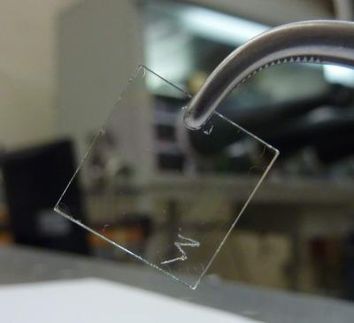JHU chemists devise self-assembling 'organic wires'
From pacemakers constructed of materials that so closely mimic human tissues that a patient's body can't discern the difference to devices that bypass injured spinal cords to restore movement to paralyzed limbs, the possibilities presented by organic electronics read like something from a science fiction novel.
Derived from carbon-based compounds, these "soft" electronic materials are valued as lightweight, flexible, easily processed alternatives to "hard" electronics components such as metal wires or silicon semiconductors. And just as the semiconductor industry is actively developing smaller and smaller transistors, so, too, are those involved with organic electronics devising ways to shrink the features of their materials, so they can be better utilized in bioelectronic applications such as those above.
To this end, a team of chemists at The Johns Hopkins University has created water-soluble electronic materials that spontaneously assemble themselves into "wires" much narrower than a human hair. An article about their work was published in the Journal of the American Chemical Society.
"What's exciting about our materials is that they are of size and scale that cells can intimately associate with, meaning that they may have built-in potential for biomedical applications," said John D. Tovar, an assistant professor in the Department of Chemistry in the Zanvyl Krieger School of Arts and Sciences. "Can we use these materials to guide electrical current at the nanoscale? Can we use them to regulate cell-to-cell communication as a prelude to re-engineering neural networks or damaged spinal cords? These are the kinds of questions we are looking forward to being able to address and answer in the coming years."
The team used the self-assembly principles that underlie the formation of beta-amyloid plaques, which are the protein deposits often associated with Alzheimer's disease, as a model for their new material. This raises another possibility: that these new electronic materials may eventually prove useful for imaging the formation of these plaques.
"Of course, much research has been done and is still being done to understand how amyloids form and to prevent or reverse their formation," Tovar said. "But the process also represents a powerful new pathway to fabricate nanoscale materials."
Topics
Organizations
Other news from the department science

Get the chemical industry in your inbox
By submitting this form you agree that LUMITOS AG will send you the newsletter(s) selected above by email. Your data will not be passed on to third parties. Your data will be stored and processed in accordance with our data protection regulations. LUMITOS may contact you by email for the purpose of advertising or market and opinion surveys. You can revoke your consent at any time without giving reasons to LUMITOS AG, Ernst-Augustin-Str. 2, 12489 Berlin, Germany or by e-mail at revoke@lumitos.com with effect for the future. In addition, each email contains a link to unsubscribe from the corresponding newsletter.



























































